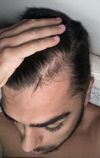community November 2018 (18) vs today, now 7 years on the drug. Propecia 1mg daily since first picture.
Finasteride improved hair appearance over seven years with no major side effects. Users discussed finasteride, minoxidil, and supplements like beta carotene and astaxanthin for hair loss treatment.
